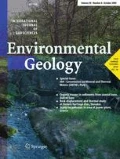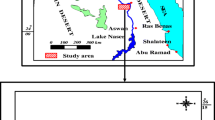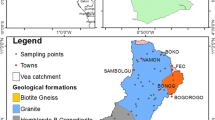Abstract.
Groundwater in the Van coastal aquifer is one of the main sources of potable, industrial and irrigational water in Van City, because of its semi-arid climate. Groundwater extraction has been in excess of replenishment owing to increased agricultural and economic activities and a growing population during the last 20 years. A hydrochemical survey of the Van aquifer provided data on the groundwater chemistry patterns and the main mineralization processes. The main processes influencing the groundwater chemistry are salinisation from salt-water intrusion, silicate mineral dissolution, cation exchange and human activity. Deterioration in water quality has resulted from intrusion of the salt water of Lake Van along the coastal regions into the Van plain. At present, the mixing rate of salt water in the Van aquifer is between 1 and 5.5% and salt water has already invaded about 5 km inland in the iskele and the airport region.
Similar content being viewed by others
Author information
Authors and Affiliations
Additional information
Electronic Publication
Rights and permissions
About this article
Cite this article
Ozler, M.H. Hydrochemistry and salt-water intrusion in the Van aquifer, east Turkey. Env Geol 43, 759–775 (2003). https://doi.org/10.1007/s00254-002-0690-0
Received:
Accepted:
Issue Date:
DOI: https://doi.org/10.1007/s00254-002-0690-0




